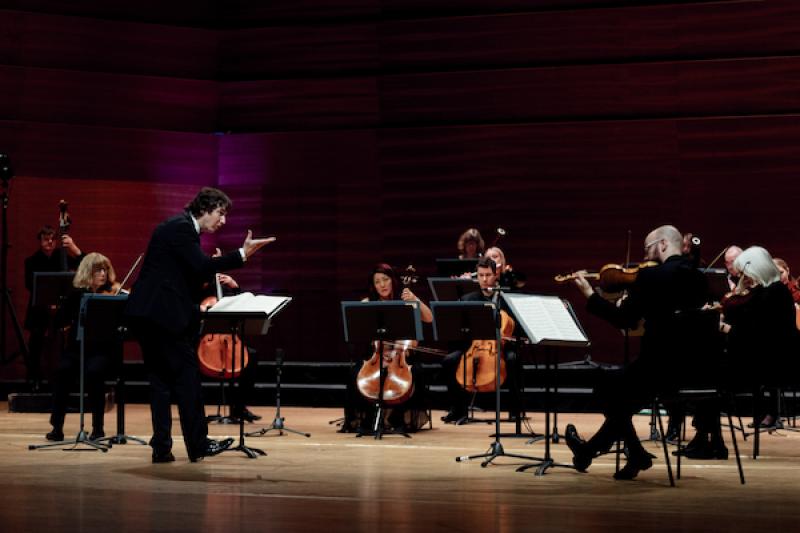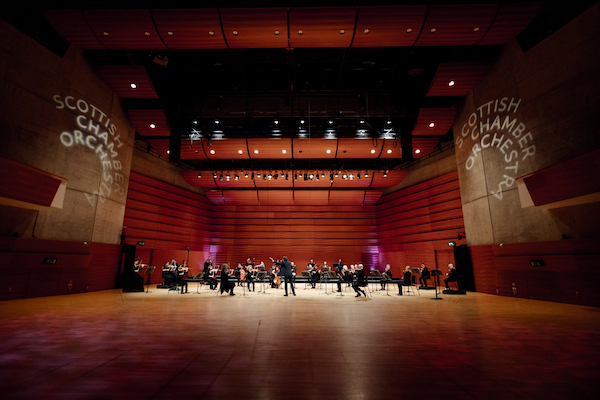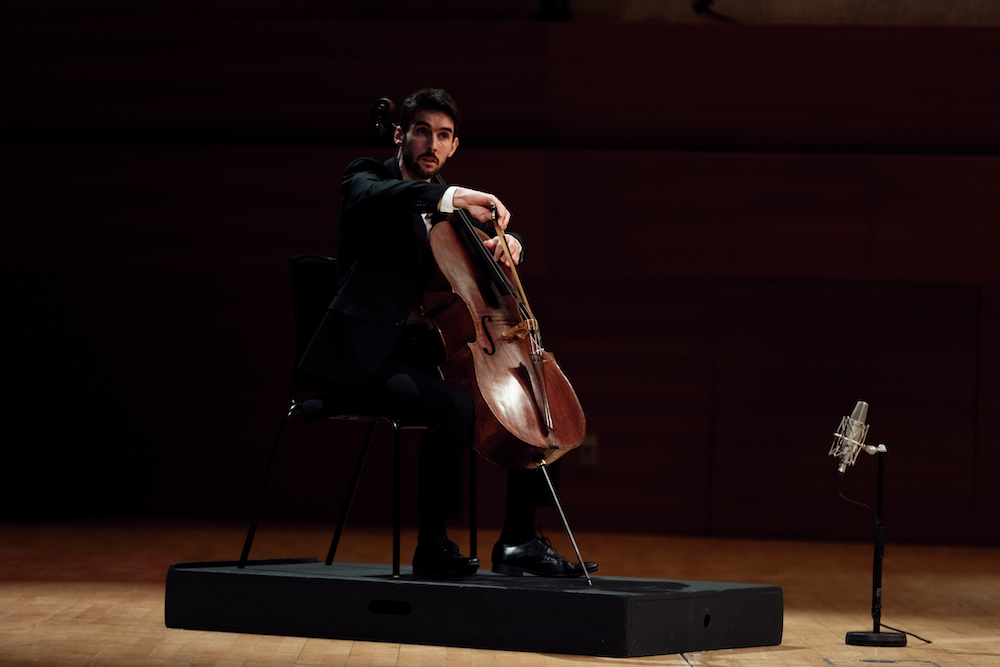Higham, Scottish Chamber Orchestra, Emelyanychev online review - I should rococo | reviews, news & interviews
Higham, Scottish Chamber Orchestra, Emelyanychev online review - I should rococo
Higham, Scottish Chamber Orchestra, Emelyanychev online review - I should rococo
Joyous Schubert and Tchaikovsky to lift the spirits

Although this streamed concert from the Scottish Chamber Orchestra featured the music of Schubert and Tchaikovsky, the ghost at the feast was Mozart, the acknowledged inspiration behind the two main pieces.
As with the SCO concert I reviewed a fortnight ago this was broadcast on YouTube, the presentation simple and unobtrusive – no son et lumiere to get in the way of the music. And the repertoire was chosen to show the advantages of a small orchestra: lithe textures, fast tempos and a wonderful transparency to the playing. I had not previously come across the orchestra’s principal conductor Maxim Emelyanychev but was delighted by his loose-limbed, ambidextrous style.
My zeal for Schubert’s Fifth Symphony is that of a convert. I was (I am ashamed to say) past 40 before I ever heard the piece, but I loved it immodestly from the very first and on some days would describe it as my favourite symphony. This is a potential double-edged situation, as I don’t want to hear it played anything other than very well. I wasn’t disappointed.  Emelyanychev took every movement it at a real lick, but without losing detail in the playing. The violins were sparkling throughout, the basses pert and the flutes lively (guest principal Brontë Hudnott really caught the ear). It’s extraordinary that Schubert wrote this music at the age of 19, such is its assurance. It is replete with all the Schubert trademarks including melodic fluency and harmonic sidesteps into unexpected, far-flung key areas, from which he always finds his way back. It is also concise, which Schubert isn’t always.
Emelyanychev took every movement it at a real lick, but without losing detail in the playing. The violins were sparkling throughout, the basses pert and the flutes lively (guest principal Brontë Hudnott really caught the ear). It’s extraordinary that Schubert wrote this music at the age of 19, such is its assurance. It is replete with all the Schubert trademarks including melodic fluency and harmonic sidesteps into unexpected, far-flung key areas, from which he always finds his way back. It is also concise, which Schubert isn’t always.
It is the third movement that is most clearly a homage to Mozart, in the shape of its main tune, the cheeky chromaticisms and the contrapuntal interplay between melody and bass. Emelyanychev and the orchestra revelled in the moments of mock-pathos, a smile never far from the surface.
Tchaikovsky’s Rococo Variations are similarly joyous in outlook, sometimes with exhilarating virtuosity, sometimes with inward tenderness. The soloist was the SCO’s principal cello Philip Higham (pictured below by Ryan Buchanan), who had the advantage of knowing the ensemble from the inside, although making the move to being out in front must have had a nerve-wracking side to it.  There was charm in abundance in his reading of the opening two movements but for an evening mainly about good humour the introvert moments of variation 3 and 5 were striking. The orchestra were excellent accompanists in this delicately scored music and Emelyanychev showed both wit and subtlety.
There was charm in abundance in his reading of the opening two movements but for an evening mainly about good humour the introvert moments of variation 3 and 5 were striking. The orchestra were excellent accompanists in this delicately scored music and Emelyanychev showed both wit and subtlety.
The only complaint (and it’s a minor one) is that the orchestra hasn’t resolved what to do about applause. After the Schubert symphony they applauded themselves slightly self-consciously, after the Tchaikovsky they applauded Philip Higham somewhat more enthusiastically and after the final item (Schubert’s Rosamunde entr’acte) they stood in silence and the lights faded out. All three of these have their drawbacks, and there is perhaps no perfect answer, but the failure to settle on any one solution was awkward.
But this gripe aside I was gripped and thoroughly recommend seeking out this performance on YouTube.
rating
Explore topics
Share this article
The future of Arts Journalism
You can stop theartsdesk.com closing!
We urgently need financing to survive. Our fundraising drive has thus far raised £49,000 but we need to reach £100,000 or we will be forced to close. Please contribute here: https://gofund.me/c3f6033d
And if you can forward this information to anyone who might assist, we’d be grateful.

Subscribe to theartsdesk.com
Thank you for continuing to read our work on theartsdesk.com. For unlimited access to every article in its entirety, including our archive of more than 15,000 pieces, we're asking for £5 per month or £40 per year. We feel it's a very good deal, and hope you do too.
To take a subscription now simply click here.
And if you're looking for that extra gift for a friend or family member, why not treat them to a theartsdesk.com gift subscription?
more Classical music
 Kilsby, Parkes, Sinfonia of London, Wilson, Barbican review - string things zing and sing in expert hands
British masterpieces for strings plus other-worldly tenor and horn - and a muscular rarity
Kilsby, Parkes, Sinfonia of London, Wilson, Barbican review - string things zing and sing in expert hands
British masterpieces for strings plus other-worldly tenor and horn - and a muscular rarity
 From Historical to Hip-Hop, Classically Black Music Festival, Kings Place review - a cluster of impressive stars for the future
From quasi-Mozartian elegance to the gritty humour of a kitchen inspection
From Historical to Hip-Hop, Classically Black Music Festival, Kings Place review - a cluster of impressive stars for the future
From quasi-Mozartian elegance to the gritty humour of a kitchen inspection
 Shibe, LSO, Adès, Barbican review - gaudy and glorious new music alongside serene Sibelius
Adès’s passion makes persuasive case for the music he loves, both new and old
Shibe, LSO, Adès, Barbican review - gaudy and glorious new music alongside serene Sibelius
Adès’s passion makes persuasive case for the music he loves, both new and old
 Anja Mittermüller, Richard Fu, Wigmore Hall review - a glorious hall debut
The Austrian mezzo shines - at the age of 22
Anja Mittermüller, Richard Fu, Wigmore Hall review - a glorious hall debut
The Austrian mezzo shines - at the age of 22
 First Person: clarinettist Oliver Pashley on the new horizons of The Hermes Experiment's latest album
Compositions by members of this unusual quartet feature for the first time
First Person: clarinettist Oliver Pashley on the new horizons of The Hermes Experiment's latest album
Compositions by members of this unusual quartet feature for the first time
 Gesualdo Passione, Les Arts Florissants, Amala Dior Company, Barbican review - inspired collaboration excavates the music's humanity
At times it was like watching an anarchic religious procession
Gesualdo Passione, Les Arts Florissants, Amala Dior Company, Barbican review - inspired collaboration excavates the music's humanity
At times it was like watching an anarchic religious procession
 Classical CDs: Camels, concrete and cabaret
An influential American composer's 90th birthday box, plus British piano concertos and a father-and-son duo
Classical CDs: Camels, concrete and cabaret
An influential American composer's 90th birthday box, plus British piano concertos and a father-and-son duo
 Cockerham, Manchester Camerata, Sheen, Martin Harris Centre, Manchester review - re-enacting the dawn of modernism
Two UK premieres added to three miniatures from a seminal event of January 1914
Cockerham, Manchester Camerata, Sheen, Martin Harris Centre, Manchester review - re-enacting the dawn of modernism
Two UK premieres added to three miniatures from a seminal event of January 1914
 Kempf, Brno Philharmonic, Davies, Bridgewater Hall, Manchester review - European tradition meets American jazz
Bouncing Czechs enjoy their Gershwin and Brubeck alongside Janáček and Dvořák
Kempf, Brno Philharmonic, Davies, Bridgewater Hall, Manchester review - European tradition meets American jazz
Bouncing Czechs enjoy their Gershwin and Brubeck alongside Janáček and Dvořák
 Solomon, OAE, Butt, QEH review - daft Biblical whitewashing with great choruses
Even a top soprano and mezzo can’t make this Handel paean wholly convincing
Solomon, OAE, Butt, QEH review - daft Biblical whitewashing with great choruses
Even a top soprano and mezzo can’t make this Handel paean wholly convincing
 Two-Piano Gala, Kings Place review - shining constellations
London Piano Festival curators and illustrious friends entertain and enlighten
Two-Piano Gala, Kings Place review - shining constellations
London Piano Festival curators and illustrious friends entertain and enlighten
 Echo Vocal Ensemble, Latto, Union Chapel review - eclectic choral programme garlanded with dance
Beautiful singing at the heart of an imaginative and stylistically varied concert
Echo Vocal Ensemble, Latto, Union Chapel review - eclectic choral programme garlanded with dance
Beautiful singing at the heart of an imaginative and stylistically varied concert

Add comment